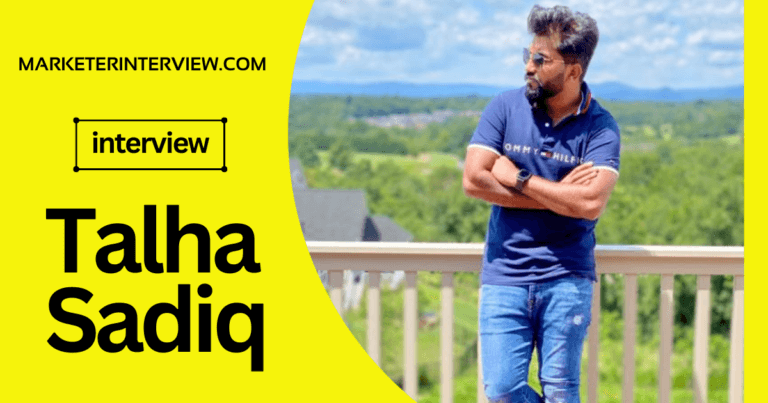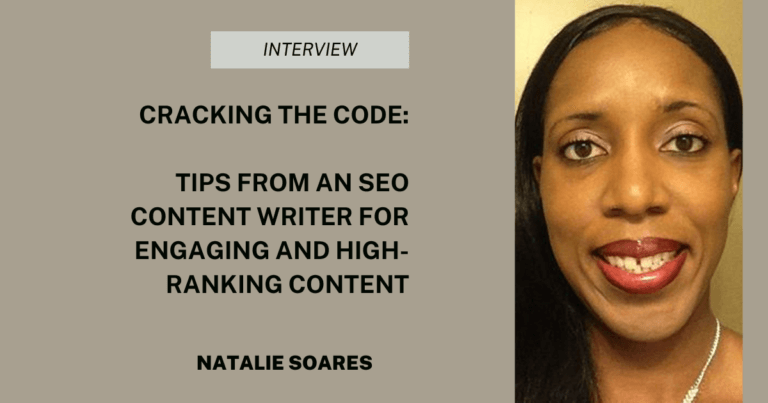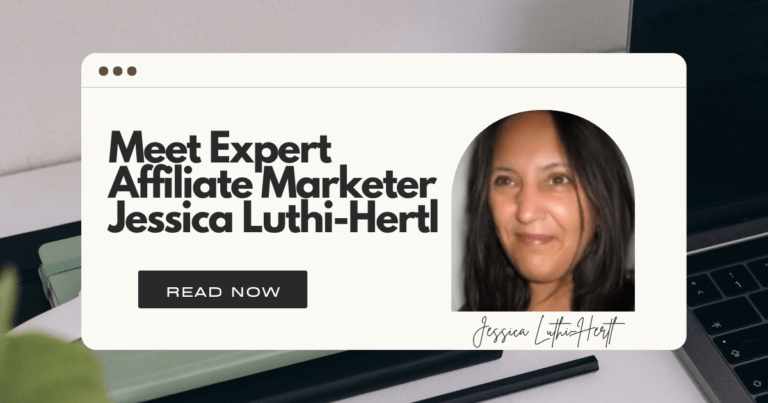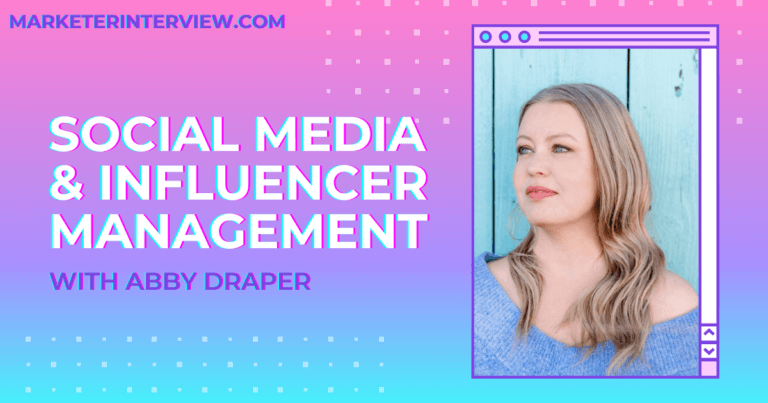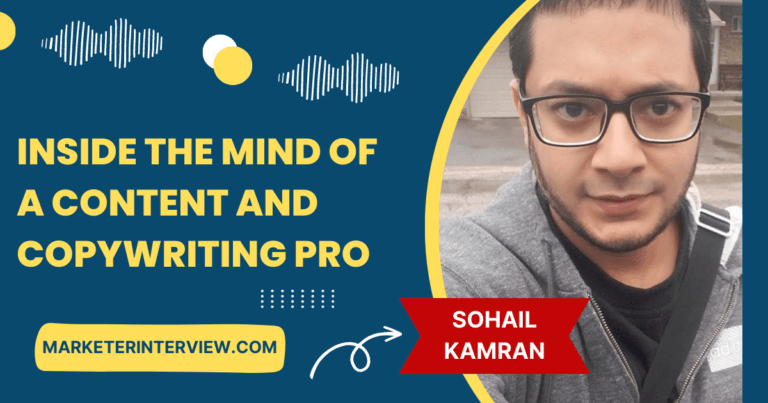Navigating the Digital Landscape: An Exclusive Interview with Zoe Ashbridge
Welcome to another insightful interview on Marketer Interview!
Today, we have the privilege of speaking with Zoe Ashbridge, a seasoned expert in the field of SEO.
Zoe’s journey from Digital Project Manager to Senior SEO and Co-founder is inspiring and informative. With a passion for data-driven strategies and a focus on consumer-centric approaches, Zoe has made significant strides in marketing.
Join us as we discover Zoe’s expertise, career trajectory, and unique SEO approach.
Want to get quoted in MarketerInterview.com content just like this? Apply to become a contributor today!
Contents
- 1 Can you share the story of how you ventured into the marketing realm?
- 2 What eventually led you to specialize in SEO?
- 3 Your profile highlights your SEO-first perspective. Please elaborate on what this means and how it shapes your marketing strategies.
- 4 Your steps to SEO success are outlined meticulously. Could you walk us through the critical components of your process, from discovery to execution?
- 5 Your testimonial mentions your dedication to understanding the entire business beyond just SEO. How do you ensure your strategies align with the broader marketing goals of a company?
- 6 Your results are impressive, including a 300% increase in traffic for an e-commerce business. Could you share a case study where your approach led to remarkable outcomes?
- 7 Staying updated is crucial with the dynamic nature of SEO and digital marketing. How are you informed about the latest industry trends and algorithm changes?
- 8 Collaboration is often essential in marketing. Could you share an example of a project where you effectively collaborated with other teams or professionals to achieve a common goal?
- 9 Your expertise spans various CMS platforms. Could you discuss the implications of different CMS choices on SEO and any recommendations for marketers selecting a platform?
- 10 Tools and software play a vital role in modern marketing. Could you provide insights into the tools you rely on for SEO analysis, keyword research, and overall campaign management?
I fell into marketing! It was a mistake, but I’m so glad it happened.
To give you some perspective on how unplanned it was, back in 2013, I held an event in my local town. It was just a fundraiser. After the success of that event, my cousin said, “‘You’d be good at marketing!”
“What’s that?” I asked. I didn’t have a clue about business or marketing. When I went to university, I wanted to be a school teacher, but partway through my English degree, I decided it wasn’t for me.
My cousin’s comment was stuck in my head, so with nowhere else to turn, I just started looking for marketing jobs. I secured some jobs in ‘marketing’ that were just administrative roles. Meanwhile, I tried to put my English degree to good use and pitched to newspapers and magazines to get published. I got a couple of pieces of writing paid for and in the British national newspaper, The Guardian.
I got my career on the rails when I met Kate Longworth. We met at dinner in York. She entered a fancy restaurant where I was dining with my then-boyfriend. She had a tag hanging out of her jumper. After some apprehensions, I plucked up the courage to tell her!
“You hero!” Kate exclaimed. She sent drinks to our table as a thank you, and we sent some back.
We clicked instantly.
Once dinner was over, we got talking.
Kate looked at me and said, “Let me guess, you want to be a teacher or work in PR.”
It was incredibly eerie, considering I did want to be a teacher and had been trying to become a writer.
Kate took my phone number.
Back home, my “marketing” role was unfulfilling and demanding, with 40 hours being the contract and 50-hour weeks being the norm. I was paid less than minimum wage, overtime was unpaid, and I hated it.
I decided, “I’m quitting.” I left that job with nowhere to go, figuring nothing was worth less than minimum wage. I could get a job anywhere and be better off.
Out of the blue, and a week or so since our first meeting, I had a call. In true serendipity, Kate offered me a job! There was one thing, though: I needed to go freelance.
“No problem,” I said. It was a dream come true.
Kate taught me the foundations of marketing. I would skip out of her office feeling so empowered. She was the first employer who ever listened to me and didn’t make me feel stupid for my junior choices.
She is still one of the most inspirational women I have ever met. She is critical in my career, and I think about her often.
After a few years, Kate’s business pivoted, and she moved away from her marketing agency and into meaningful causes like You in Mind and Gaia Learning.
Although Kate was my first client and boss when I was ready to pivot my career, I asked her for advice on where I should apply, and despite our relationship coming to a natural end, Kate helped me find my feet in a new marketing agency.
A lot changed for me there. I met my new boyfriend, made some of the best friends of my life, and learned digital marketing. And I was there introduced to SEO by a talented SEO manager.
He was reader-focused and best practice-focused. I learned so much from him and had a lot of respect for his methodologies.
What eventually led you to specialize in SEO?
Well, that’s a story. As I said, I met my now boyfriend while working at that digital agency.
A month into our dating, he said he planned to quit his job and cycle around the world. He asked me if I wanted to come. I said yes instantly.
We saved hard for nine months, and we put in our notice. I loved my job so much and wondered if travel could fulfill me.
While cycling around the world, I started writing a blog, www.roadtoframe.com. I wanted other cycle tourists to find the blog, so I applied everything I’d learned in the agency. I got my first page one rank for a low search, long tail keyword, “cycling in Azerbaijan.”
That was it. I was hooked.
After nine months of traveling, I missed work. I started to apply for jobs on Upwork. I wanted to see if I could work and travel forever! I just loved it. I wrote 500 – 3000 word articles for as little as $10 or $15, but I didn’t care about money. I just loved working freelance.
One year into our travel plans, COVID-19 happened, forcing my travels to end abruptly. I moved back home into my boyfriend’s mum’s house and got a job in the local supermarket.
We were amid Covid, and even my old agency wouldn’t take me back as they weren’t sure what was happening. At the time, it was all furlough and scary times for businesses.
With nothing else, I just carried on with Upwork, writing, optimizing work as best I could, and securing ranks for my clients. It took 12 weeks for freelancing to take off so that I could quit my job at the supermarket and afford to move out into my place. The freedom was incredible!
A lot of my work back then was writing work, but I desperately wanted people to find my writing and my clients to be happy, so I over-serviced everyone. I wanted to learn SEO so bad I kept picking away and getting better and better each day. I did free courses and read tons and tons of blogs.
After much practice and failure, I ended up where I am today and could not be more thankful.
Don’t give up on your dreams, and follow the quiet, quiet nudges that life gives us. There’s a greater plan for all of us if we tap into it and listen.
Your profile highlights your SEO-first perspective. Please elaborate on what this means and how it shapes your marketing strategies.
An SEO-first perspective means that I turn to SEO data to help construct a marketing strategy. SEO leads the way as it has to be one of the most data-driven marketing tactics.
SEO research lets you find every problem your buyer has across the entire marketing funnel. You can “piggyback” on the incredible Google algorithm to understand precisely why people are searching what they are and exactly what they’re looking for.
This information is terrific for SEO and content strategy but can be transferred to other marketing tactics like email, PPC, or social.
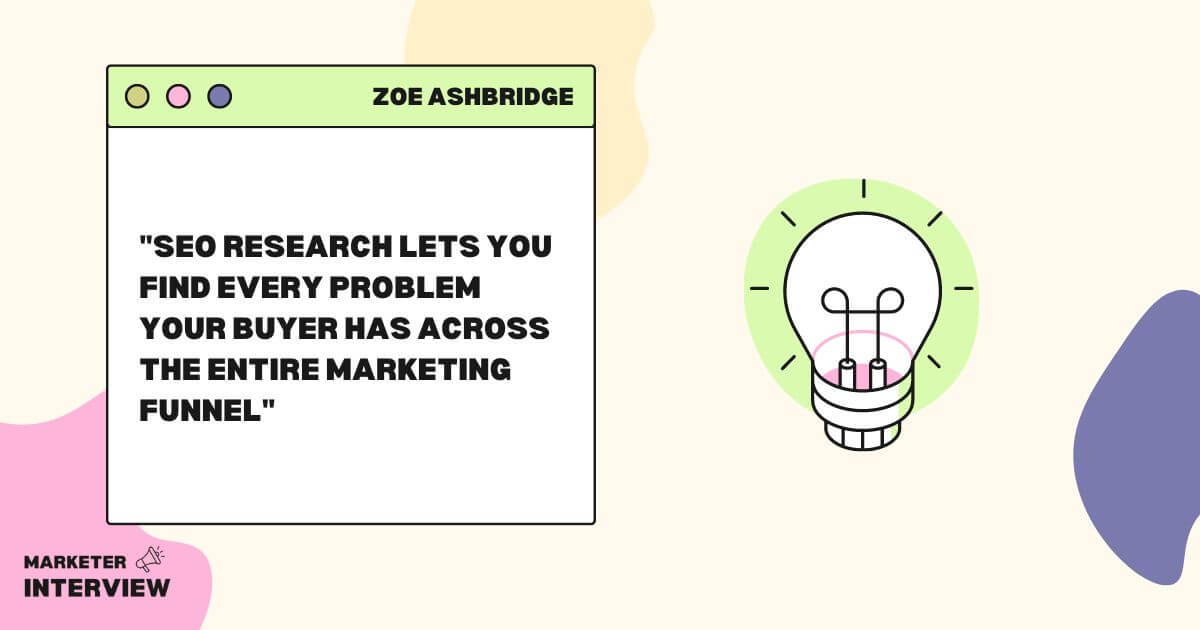
Your steps to SEO success are outlined meticulously. Could you walk us through the critical components of your process, from discovery to execution?
- Audit: Every project begins with an audit. And when I say audit, I don’t mean a print-off from a tool like Semrush or Ahrefs. I mean a full audit with detained research, actionable next steps, and a roadmap to success.
- The research phase includes everything from studying GSC, analytical tools, understanding what’s working, detailed competitor analysis, keyword research, content discovery, and more.
- Research sharing everything is shared with an internal team after the research phase. I love this phase because it helps me draw insights from the internal team. It’s an exciting point in the project. I know quite a lot about their site now and come to the table with loads of ideas, and it inspires more insightful comments from then.
- Plan of action with new-founded nuggets from the internal team: I get to create the plan using all that lovely research. Anything I can directly tie to a business objective takes priority, and anything that doesn’t move the needle sits on the back burner.
- Once the above is done, we can work and make the magic happen!
Your testimonial mentions your dedication to understanding the entire business beyond just SEO. How do you ensure your strategies align with the broader marketing goals of a company?
You have to align SEO with your client or company’s marketing and business objectives. First, you must understand precisely what the business is trying to achieve. I do this during discovery meetings.
I want to know the business objectives so I can create marketing goals – specifically SEO goals – that will help them get there.
Whenever you think about SEO, think about what will bring in the money first, then create the strategy around that. Everything you do should be in pursuit of a revenue-generating goal. Forget changing title tags for the sake of changing title tags.
Change title tags because they will help rank for X, which will help convert XX people per month. Or, create content that will bring XXXX qualified visitors to the site each month.
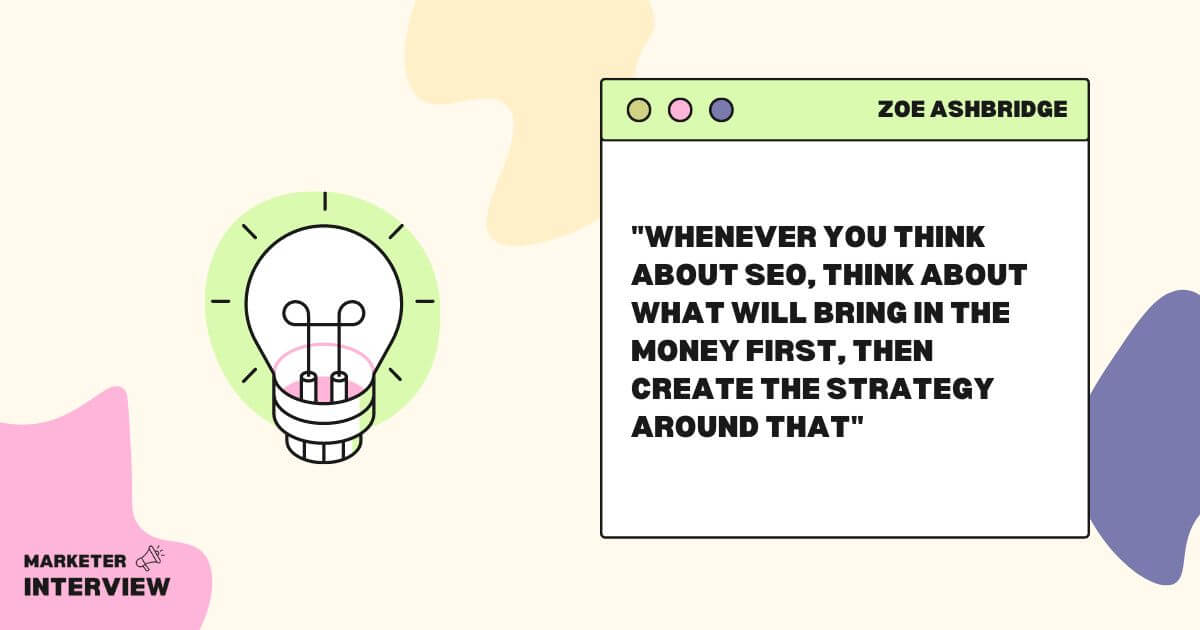
I can share a bit about that exact case study, a 300% increase for an e-commerce brand; that was wild and reasonably early in my career!
I’d learned about content clusters, and everything changed! I felt like I knew how to do SEO back then. I did, to be fair, but I was a bit short-sighted, going for traffic instead of revenue.
Anyway, it was a great case study because this particular client was in a highly competitive market, and with a content strategy, we ended up with millions of people on the site. We also started to get page one ranks for BOFU (bottom of the funnel) keywords. My client, a small name in the industry, was ranked against some of the biggest names, including household names. That felt cool.
It’s incredible what you can achieve with a solid content strategy.
In short, we found a keyword/revenue-generating page we wanted to rank for, and then we created everything you could even dream up related to that topic. We wanted people on our site who were searching for everything. We then internally linked relevant articles and aimed to push traffic to that bottom-funnel page.
Staying updated is crucial with the dynamic nature of SEO and digital marketing. How are you informed about the latest industry trends and algorithm changes?
There are a few ways that I keep myself in the know.
Join Slack groups like Mostly Marketing or Women in Tech SEO
Join Facebook groups like Sisters in SEO
Read, read, read, and read: Google’s Search and SEO blog, articles in Moz, Ahrefs, Semrush, Screaming Frog, HubSpot, Search Engine Land, SEO Roundtable, Search Engine Journal, etc.
Listen to podcasts: At the moment, my favorite is Contrarian Marketing. SERPs Up with Wix, Search Off The Record with Google Search Central, and Women in Tech SEO have their podcasts.
Finally, get active on LinkedIn follow-up (people who aspired to be like.) Start sending messages and commenting. Build your community of excellent SEOs! You’ll be AMAZED at how many people are sharing incredible tips and insights into the SEO world.
Every project is a collaborative one for me. I guess that’s why I ended up founding an agency instead of working solo; I just love working with people.
As part of the Forank team, we have SEO, PPC, former web developers now working in technical SEO, data analysts, writers, editors, and more.
One project that springs to mind is where I worked with Co-founder Leigh Buttrey, and we got a 64% increase in revenue for one of our clients. We worked with SEO, providing keyword data, content creation, and an audience suitable for remarketing. Leigh then remarketed to our qualified audience through ads and captured the demand!
As a Co-founder, you’ve been hands-on in strategy and the business’s growth. What challenges and rewards have you experienced in this dual role?
Rewards beyond measure, an incredible team of people who are genuinely unique at what they do and driven for excellence. At Forank, it’s so important that we have a team who are fulfilled in their work.
We have team members in Asia, Europe, America and Oceania. Everyone is paid fairly and to UK standards, no matter where they are. I find that deeply fulfilling.
The rewards just keep coming, too. I didn’t expect to build a business like this. It just happened.
Because I take the steps very slowly, with few expectations, I don’t have many challenges. I’m not here to try and earn a load of cash to scale a business and sell it; I just want to be happy and for my team to be happy.
That said, the biggest challenge is finding good freelancers.
Your expertise spans various CMS platforms. Could you discuss the implications of different CMS choices on SEO and any recommendations for marketers selecting a platform?
I’ve ranked websites on WordPress, Magento, Shopify, Squarespace, and even some headless/custom CMS. Generally, you don’t need to worry about the CMS. Just get the CMS that works best for you.
As long as Google can read HTML, your site can rank. That said, every CMS has benefits and downsides, so do your research and make sure whoever builds your site knows about the SEO pitfalls of your chosen CMS so they can build it in a way that helps you rather than hinders your SEO.
One thing for marketers is to avoid getting hung up on creating something new. You don’t need to reinvent the wheel. Most companies will do fine with a CMS like WordPress, Magento, or Shopify.
Tools and software play a vital role in modern marketing. Could you provide insights into the tools you rely on for SEO analysis, keyword research, and overall campaign management?
I use quite a few, but the main three are
- Google Search Console
- Analytics/G4
- Semrush
I like Asana for project management.
Finally, what advice would you offer for aspiring marketers looking to specialize in SEO? Are there any critical skills or mindsets they should cultivate?
Do some free courses like those listed on HubSpot or even Yoast Academy. Follow my advice above and start learning from the resources I’ve shared.
Regarding soft skills, work on client management and learn to position everything positively without lying. Get better at project management so you can keep track of your time and deliver what was expected on time.


